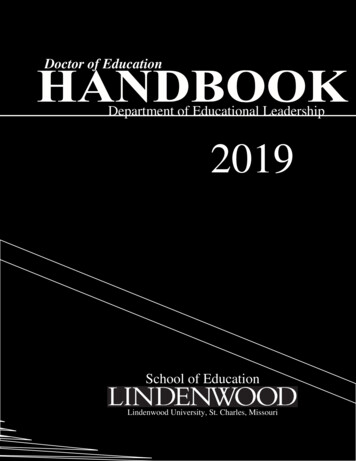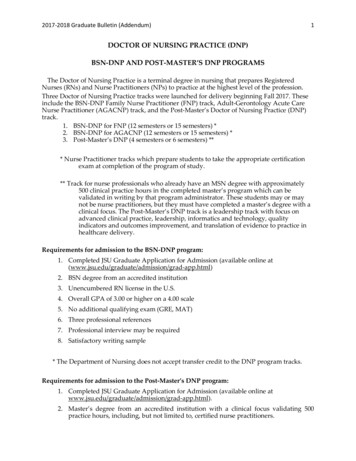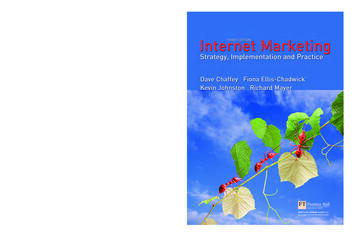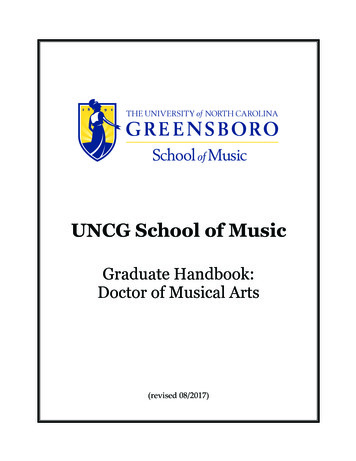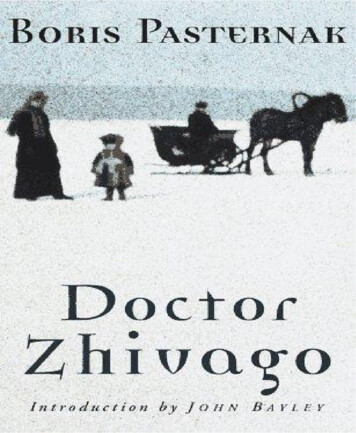
Transcription
DoctorZhivagoBORIS PASTERNAK
ASIGNET BOOKPublished by THE NEW AMERICAN LIBRARY 1957 Giangiacomo Feltrinelli Editore, Milano, Italy 1958 in the English translationWm. Collins Sons & Co., Ltd., London
1958 in authorized revisions to the English translationby Pantheon Books, Inc., New York, New York.All rights reserved. No part of this book may bereproduced without permission. For information addressPantheon Books, Inc., 22 East 51st Street,New York, New York 10022.This is an authorized reprint of a hardcover editionpublished by Pantheon Books, Inc.TWENTY-FIRST PRINTINGTranslated from the Russian by Max Hayward andManya Harari; " The Poems of Yurii Zhivago, "translated by Bernard Guilbert Guerney.
SIGNET TRADEMARK REG. U.S. PAT. OFF.AND FOREIGN COUNTRIESREGISTERED TRADEMARK—MARCAREGISTRADAHECHO EN CHICAGO, U.S.A.SIGNET BOOKS are published byThe NewAmerican Library , Inc.,1301 Avenue of the Americas ,New York , New York 10019PRINTED IN THE UNITED STATES OF AMERICAThe Principal Characters in This Book
YuriiAndreievich Zhivago (as a child, called Yura;affectionately, Yurochka) is the son of Andrei Zhivago, aprofligate, and Maria Nikolaievna Zhivago. EvgrafAndreievich Zhivago, his half-brother, is the son of his fatherand Princess Stolbunova-Enrici. Nikolai NikolaievichVedeniapin (Uncle Kolia) is his maternal uncle.Antonina Alexandrovna Gromeko (Tonia) is the daughter ofAlexander Alexandrovich Gromeko , a professor ofchemistry, and his wife, Anna Ivanovna, whose father wasthe landowner and ironmaster Ivan Ernestovich Krueger. Asyoung people, Yurii Andreievich Zhivago and Misha Gordon,son of a lawyer, live with the Gromekos.Larisa Feodorovna Guishar (Lara) is the daughter of aRussianized, widowed Frenchwoman, Amalia KarlovnaGuishar. Rodion (Rodia) is her younger brother.Victor Ippolitovich Komarovsky was Andrei Zhivago ' s lawyerand is Madame Guishar ' s lover and adviser.Lavrentii Mikhailovich Kologrivov is a rich industrialist; hiswife, Serafima Filippovna; their daughters, Nadia and Lipa.Pavel Pavlovich Antipov (Pasha, Pashenka) is the son of arailway worker, Pavel Ferapontovich Antipov. After his father 's exile to Siberia, he lives with the Tiverzins (Kuprian
Savelievich and his mother, Marfa Gavrilovna), anotherrevolutionary family of railway workers.Osip Gimazetdinovich Galiullin (Yusupka), son of Gimazetdin,the janitor at the Tiverzins ' tenement; he is a Moslem.InnokentiiDudorov (Nika), son of Dementii Dudorov, arevolutionary terrorist, and a Georgian princess.Markel Shchapov , porter at the Gromekos ' house, and hisdaughter Marina (Marinka).
PART ONEONEThe Five-O ' Clock ExpressOn they went, singing " Rest Eternal, " and whenever theystopped, their feet, the horses, and the gusts of wind seemed tocarry on their singing.Passers-by made way for the procession, counted the wreaths,and crossed themselves. Some joined in out of curiosity andasked: " Who is being buried? " — " Zhivago, " they were told.— " Oh, I see. That ' s what it is. " — " It isn ' t him. It ' s his wife." — " Well, it comes to the same thing. May her soul rest inpeace. It ' s a fine funeral. "The last moments slipped by, one by one, irretrievable. " Theearth is the Lord ' s and the fullness thereof, the earth andeverything that dwells therein. " The priest, with the gesture of across, scattered earth over the body of Maria Nikolaievna. Theysang " The souls of the righteous. " Then a fearful bustle began.The coffin was closed, nailed, and lowered into the ground.Clods of earth rained on the lid as the grave was hurriedly filled
by four spades. A little mound formed. A ten-year-old boyclimbed on it. Only the state of stupor and insensibility which isgradually induced by all big funerals could have created theimpression that he intended to speak over his mother ' s grave.He raised his head and from his vantage point absently glancedabout the bare autumn landscape and the domes of themonastery. His snub-nosed face became contorted and hestretched out his neck. If a wolf cub had done this, everyonewould have thought that it was about to howl. The boy coveredhis face with his hands and burst into sobs. The wind bearingdown on him lashed his hands and face with cold gusts of rain.A man in black with tightly fitting sleeves went up to the grave.This was Nikolai Nikolaievich Vedeniapin, the dead woman ' sbrother and the uncle of the weeping boy; a former priest, hehad been unfrocked at his own request. He went up to the boyand led him out of the graveyard.2They spent the night at the monastery, where Uncle Nikolai wasgiven a room for old times ' sake. It was on the eve of the Feastof the Intercession of the Holy Virgin. The next day they weresupposed to travel south to a provincial town on the Volgawhere Uncle Nikolai worked for the publisher of the localprogressive newspaper. They had bought their tickets and theirthings stood packed in the cell. The station was near by, and
they could hear the plaintive hooting of engines shunting in thedistance.It grew very cold that evening. The two windows of the cell wereat ground level and looked out on a corner of the neglectedkitchen garden, a stretch of the main road with frozen puddleson it, and the part of the churchyard where Maria Nikolaievnahad been buried earlier in the day. There was nothing in thekitchen garden except acacia bushes around the walls and afew beds of cabbages, wrinkled and blue with cold. With eachblast of wind the leafless acacias danced as if possessed andthen lay flat on the path.During the night the boy, Yura, was wakened by a knocking atthe window. The dark cell was mysteriously lit up by a flickeringwhiteness. With nothing on but his shirt, he ran to the windowand pressed his face against the cold glass.Outside there was no trace of the road, the graveyard, or thekitchen garden, nothing but the blizzard, the air smoking withsnow. It was almost as if the snowstorm had caught sight of Yuraand, conscious of its power to terrify, roared and howled, doingeverything possible to impress him. Turning over and over in thesky, length after length of whiteness unwound over the earth andshrouded it. The blizzard was alone in the world; it had no rival.When he climbed down from the window sill Yura ' s firstimpulse was to dress, run outside, and start doing something.
He was afraid that the cabbage patch would be buried so thatno one could dig it out and that his mother would helplessly sinkdeeper and deeper away from him into the ground.Once more it ended in tears. His uncle woke up, spoke to himof Christ, and tried to comfort him, then yawned and stoodthoughtfully by the window. Day was breaking. They began todress.3While his mother was alive Yura did not know that his father hadabandoned them long ago, leading a dissolute life in Siberiaand abroad and squandering the family millions. He was alwaystold that his father was away on business in Petersburg or atone of the big fairs, usually at Irbit.His mother had always been sickly. When she was found tohave consumption she began to go to southern France andnorthern Italy for treatment. On two occasions Yura went withher. He was often left with strangers, different ones each time.He became accustomed to such changes, and against thisuntidy background, surrounded with continual mysteries, hetook his father ' s absence for granted.He could remember a time in his early childhood when a largenumber of things were still known by his family name. There wasa Zhivago factory, a Zhivago bank, Zhivago buildings, a Zhivago
necktie pin, even a Zhivago cake which was a kind of baba aurhum, and at one time if you said " Zhivago " to your sleighdriver in Moscow, it was as if you had said: " Take me toTimbuctoo! " and he carried you off to a fairy-tale kingdom. Youwould find yourself transported to a vast, quiet park. Crowssettled on the heavy branches of firs, scattering the hoarfrost;their cawing echoed and reechoed like crackling wood. Purebred dogs came running across the road out of the clearingfrom the recently constructed house. Farther on, lightsappeared in the gathering dusk.And then suddenly all that was gone. They were poor.4One day in the summer of 1903, Yura was driving across fieldsin a two-horse open carriage with his Uncle Nikolai. They wereon their way to see Ivan Ivanovich Voskoboinikov, a teacher andauthor of popular textbooks, who lived at Duplyanka, the estateof Kologrivov, a silk manufacturer, and a great patron of the arts.It was the Feast of the Virgin of Kazan. The harvest was in fullswing but, whether because of the feast or because of themidday break, there was not a soul in sight. The half-reapedfields under the glaring sun looked like the half-shorn heads ofconvicts. Birds were circling overhead. In the hot stillness theheavy-eared wheat stood straight. Neat sheaves rose above
the stubble in the distance; if you stared at them long enoughthey seemed to move, walking along on the horizon like landsurveyors taking notes." Whose fields are these? " Nikolai Nikolaievich asked Pavel,the publisher ' s odd-job man who sat sideways on the box,shoulders hunched and legs crossed to show that driving wasnot his regular job. " The landlord ' s or the peasants ' ? "" These are the master ' s. " Pavel, who was smoking, after along silence jabbed with the end of his whip in another direction:" And those are the peasants ' !—Get along, " he shouted at thehorses, keeping an eye on their tails and haunches like anengineer watching his pressure gauge. The horses were likehorses the world over: the shaft horse pulled with the innatehonesty of a simple soul while the off horse arched its neck likea swan and seemed to the uninitiated to be an inveterate idlerwho thought only of prancing in time to the jangling bells.Nikolai Nikolaievich had with him the proofs of Voskoboinikov 's book on the land question; the publisher had asked the authorto revise it in view of the increasingly strict censorship." The people are getting out of hand here, " he told Pavel. " Amerchant in a near-by village has had his throat slit and thecounty stud farm has been burned down. What do you make ofit? Any talk of it in your village? "
But evidently Pavel took an even gloomier view than the censorwho urged Voskoboinikov to moderate his passionate views onthe agrarian problem." Talk of it? The peasants have been spoiled—treated too well.That ' s no good for the likes of us. Give the peasants rope andGod knows we ' ll all be at each other ' s throats in no time.—Get along, there! "This was Yura ' s second trip with his uncle to Duplyanka. Hethought he remembered the way, and every time the fieldsspread out, forming a narrow border around the woods, itseemed to him he recognized the place where the road wouldturn right and disclose briefly a view of the six-mile-longKologrivov estate, with the river gleaming in the distance andthe railway beyond it. But each time he was mistaken. Fieldsfollowed fields and were in turn lost in woods. These vastexpanses gave him a feeling of freedom and elation. Theymade him think and dream of the future.Not one of the books that later made Nikolai Nikolaievichfamous was yet written. Although his ideas had taken shape, hedid not know how close was their expression. Soon he was totake his place among contemporary writers, universityprofessors, and philosophers of the revolution, a man whoshared their ideological concern but had nothing in commonwith them except their terminology. All of them, withoutexception, clung to some dogma or other, satisfied with words
and superficialities, but Father Nikolai had gone throughTolstoyism and revolutionary idealism and was still movingforward. He passionately sought an idea, inspired, graspable,which in its movement would clearly point the way towardchange, an idea like a flash of lightning or a roll of thundercapable of speaking even to a child or an illiterate. He thirstedfor something new.Yura enjoyed being with his uncle. He reminded him of hismother. Like hers, his mind moved with freedom and welcomedthe unfamiliar. He had the same aristocratic sense of equalitywith all living creatures and the same gift of taking in everythingat a glance and of expressing his thoughts as they first came tohim and before they had lost their meaning and vitality.Yura was glad that his uncle was taking him to Duplyanka. It wasa beautiful place, and this too reminded him of his mother, whohad been fond of nature and had often taken him for countrywalks.He also looked forward to seeing Nika Dudorov again, thoughNika, being two years older, probably despised him. Nika wasa schoolboy who lived at the Voskoboinikovs ' ; when he shookhands with Yura, he jerked his arm downwards with all his mightand bowed his head so low that his hair flopped over hisforehead and hid half his face.5
" The vital nerve of the problem of pauperism, " NikolaiNikolaievich read from the revised manuscript." Essence would be better, I think, " said Ivan Ivanovich, makingthe correction on the galleys.They were working in the half-darkness of the glassed-inveranda. Watering cans and gardening tools lay about, araincoat was flung over the back of a broken chair, mud-cakedhip boots stood in a corner, their uppers collapsed on the floor." On the other hand, the statistics of births and deaths show, "dictated Nikolai Nikolaievich." Insert ' for the year under review, ' " said Ivan Ivanovich andmade a note. There was a slight draft. Pieces of granite lay onthe sheets as paperweights.When they finished Nikolai Nikolaievich wanted to leave atonce." There ' s a storm coming. We must be off. "" Nothing of the sort. I won ' t let you. We ' re going to have teanow. "" But I must be back in town by night. "
" It ' s no use arguing. I won ' t hear of it. "From the garden, a whiff of charcoal smoke from the samovardrifted in, smothering the smell of tobacco plant and heliotrope.A maid carried out a tray with clotted cream, berries, andcheese cakes. Then they were told that Pavel had gone off tobathe in the river and had taken the horses with him. NikolaiNikolaievich had to resign himself to staying." Let ' s go down to the river while they ' re getting tea ready, "suggested Ivan Ivanovich.On the strength of his friendship with Kologrivov, he had the useof two rooms in the manager ' s house. The cottage with its ownsmall garden stood in a neglected corner of the park, near theold drive, now thickly overgrown with grass and no longer usedexcept for carting rubbish to the gully, which served as a dump.Kologrivov, a man of advanced views and a millionaire whosympathized with the revolution, was abroad with his wife. Onlyhis two daughters, Nadia and Lipa, with their governess and asmall staff of servants, were on the estate.A thick hedge of blackthorn separated the manager ' s houseand garden from the park with its lawns and artificial lakeswhich surrounded the main house. As Ivan Ivanovich and NikolaiNikolaievich skirted the hedge, small flocks of sparrows flew outat regular intervals. The blackthorn swarmed with them, andtheir even chatter accompanied them like water flowing in a
pipe.They passed the hothouses, the gardener ' s cottage, and theruins of some stone structure. They were talking about newtalent in science and literature." Yes, there are gifted men, " said Nikolai Nikolaievich; " but thefashion nowadays is all for groups and societies of every sort.Gregariousness is always the refuge of mediocrities, whetherthey swear by Solovi ë v or Kant or Marx. Only individuals seekthe truth, and they shun those whose sole concern is not thetruth. How many things in the world deserve our loyalty? Veryfew indeed. I think one should be loyal to immortality, which isanother word for life, a stronger word for it. One must be true toimmortality—true to Christ! Ah, you ' re turning up your nose, mypoor man. As usual, you haven ' t understood a thing. "" Hmm, " said Ivan Ivanovich. Thin, fair-haired, restless as aneel, he had a mocking little beard that made him look like anAmerican of Lincoln ' s time: he was always bunching it up in hishand and nibbling the tip. " I say nothing, of course. As youknow, I look at these things rather differently. But while we ' re atit, tell me, what was it like when they unfrocked you? I bet youwere scared. They didn ' t anathematize you, did they? "" You ' re trying to change the subject. However, why not. Anathematize me? No, they don ' t do that any more. It wasunpleasant, and there are certain consequences. For instance,
one is banned from the civil service for quite a long time, and Iwas forbidden to go to Moscow or Petersburg. But these aretrifles. As I was saying, one must be true to Christ. I ' ll explain.What you don ' t understand is that it is possible to be anatheist, it is possible not to know whether God exists, or why,and yet believe that man does not live in a state of nature but inhistory, and that history as we know it now began with Christ,and that Christ ' s Gospel is its foundation. Now what is history?It is the centuries of systematic explorations of the riddle ofdeath, with a view to overcoming death. That ' s why peoplediscover mathematical infinity and electromagnetic waves, that 's why they write symphonies. Now, you can ' t advance in thisdirection without a certain faith. You can ' t make suchdiscoveries without spiritual equipment. And the basic elementsof this equipment are in the Gospels. What are they? To beginwith, love of one ' s neighbor, which is the supreme form of vitalenergy. Once it fills the heart of man it has to overflow andspend itself. And then the two basic ideals of modern man—without them he is unthinkable—the idea of free personalityand the idea of life as sacrifice. Mind you, all this is stillextraordinarily new. There was no history in this sense amongthe ancients. They had blood and beastliness and cruelty andpockmarked Caligulas who do not suspect how untalentedevery enslaver is. They had the boastful dead eternity of bronzemonuments and marble columns. It was not until after thecoming of Christ that time and man could breathe freely. It wasnot until after Him that men began to live toward the future. Mandoes not die in a ditch like a dog—but at home in history, while
does not die in a ditch like a dog—but at home in history, whilethe work toward the conquest of death is in full swing; he diessharing in this work. Ouf! I got quite worked up, didn ' t I? But Imight as well be talking to a blank wall. "" That ' s metaphysics, my dear fellow. It ' s forbidden by mydoctors, my stomach won ' t take it. "" Oh well, you ' re hopeless. Let ' s leave it. Goodness, what aview, you lucky devil. Though I suppose as you live with it everyday you don ' t see it. "It was hard to keep one ' s eyes on the shimmering river, which,like a sheet of polished metal, reflected the glare of the sun.Suddenly its surface parted in waves. A big ferry loaded withcarts, horses, and peasants and their women started for theother shore." Just think, it ' s only a little after five, " said Ivan Ivanovich. "There ' s the express from Syzran. It passes here at five pastfive. "Far out on the plain, crossing it from right to left, came a neatlittle yellow and blue train, tiny in the distance. Suddenly theynoticed that it had stopped. White puffs of steam flurried overthe engine, and then came a prolonged whistle. " That ' sstrange, " said Voskoboinikov. " Something ' s wrong. It has nobusiness to stop in the middle of the marsh out there.Something must have happened. Let ' s go and have tea. "
6Nika was neither in the garden nor in the house. Yura guessedthat he was hiding because they bored him, and because Yurawas too young for him. When his uncle and Ivan Ivanovich wenton the veranda to work, Yura was left to wander aimlessly aboutthe grounds.How enchanting this place was! Orioles kept making their clearthree-note calls, stopping each time just long enough to let thecountryside suck in the moist fluting sounds down to the lastvibration. A heavy fragrance, motionless, as though having lostits way in the air, was fixed by the heat above the flower beds.This brought back memories of Antibes and Bordighera. Yuraturned this way and that. The ghost of his mother ' s voice washallucinatingly present in the meadows. He heard it in themusical phrases of the birds and the buzzing of the bees. Nowand then he imagined with a start that his mother was callinghim, asking him to join her somewhere.He walked to the gully and climbed from the clear coppice at itsedge into the alder thicket that covered its bottom.Down there among the litter of fallen branches it was dark anddank; flowers were few, and the notched stalks of horsetaillooked like the staffs with Egyptian ornaments in his illustratedBible.
Yura felt more and more lonely. He wanted to cry. He slumped tohis knees and burst into tears." Angel of God, my holy guardian, " he prayed, " keep me firmlyon the path of truth and tell Mother I ' m all right, she ' s not toworry. If there is a life after death, O Lord, receive Mother intoYour heavenly mansions where the faces of the saints and of thejust shine like stars. Mother was so good, she couldn ' t havebeen a sinner, have mercy on her, Lord, and please don ' t lether suffer. Mother! " —in his heart-rending anguish he called toher as though she were another patron saint, and suddenly,unable to bear any more, fell down unconscious.He was not unconscious for long. When he came to, he heardhis uncle calling him from above. He answered and began toclimb. Suddenly he remembered that he had not prayed for hismissing father, as Maria Nikolaievna had taught him to.But his fainting spell had left him with a sense of lightness andwell-being that he was unwilling to lose. He thought that nothingterrible would happen if he prayed for his father some othertime, as if saying to himself, " Let him wait. " Yura did notremember him at all.7In a second-class compartment of the train sat Misha Gordon,
who was travelling with his father, a lawyer from Gorenburg.Misha was a boy of eleven with a thoughtful face and big darkeyes; he was in his second year of gymnasium. His father,Grigory Osipovich Gordon, was being transferred to a new postin Moscow. His mother and sisters had gone on some timebefore to get their apartment ready.Father and son had been travelling for three days.Russia, with its fields, steppes, villages, and towns, bleachedlime-white by the sun, flew past them wrapped in hot clouds ofdust. Lines of carts rolled along the highways, occasionallylumbering off the road to cross the tracks; from the furiouslyspeeding train it seemed that the carts stood still and thehorses were marking time.At big stations passengers jumped out and ran to the buffet; thesun setting behind the station garden lit their feet and shoneunder the wheels of the train.Every motion in the world taken separately was calculated andpurposeful, but, taken together, they were spontaneouslyintoxicated with the general stream of life which united them all.People worked and struggled, each set in motion by themechanism of his own cares. But the mechanisms would nothave worked properly had they not been regulated andgoverned by a higher sense of an ultimate freedom from care.This freedom came from the feeling that all human lives were
interrelated, a certainty that they flowed into each other—ahappy feeling that all events took place not only on the earth, inwhich the dead are buried, but also in some other region whichsome called the Kingdom of God, others history, and still othersby some other name.To this general rule Misha was an unhappy, bitter exception. Afeeling of care remained his ultimate mainspring and was notrelieved and ennobled by a sense of security. He knew thishereditary trait in himself and watched morbidly and selfconsciously for symptoms of it in himself. It distressed him. Itspresence humiliated him.For as long as he could remember he had never ceased towonder why, having arms and legs like everyone else, and alanguage and way of life common to all, one could be differentfrom the others, liked only by few and, moreover, loved by noone. He could not understand a situation in which if you wereworse than other people you could not make an effort toimprove yourself. What did it mean to be a Jew? What was thepurpose of it? What was the reward or the justification of thisimpotent challenge, which brought nothing but grief?When Misha took the problem to his father he was told that hispremises were absurd, and that such reasonings were wrong,but he was offered no solution deep enough to attract him or tomake him bow silently to the inevitable.
And making an exception only for his parents, he graduallybecame contemptuous of all grownups who had made thismess and were unable to clear it up. He was sure that when hewas big he would straighten it all out.Now, for instance, no one had the courage to say that his fathershould not have run after that madman when he had rushed outonto the platform, and should not have stopped the train when,pushing Grigory Osipovich aside, and flinging open the door, hehad thrown himself head first out of the express like a diver froma springboard into a swimming pool.But since it was his father who had pulled the emergencyrelease, it looked as if the train had stopped for such aninexplicably long time because of them.No one knew the exact cause of the delay. Some said that thesudden stop had damaged the air brakes, others that they wereon a steep gradient and one engine could not make it. A thirdview was that as the suicide was a prominent person, hislawyer, who had been with him on the train, insisted on officialsbeing called from the nearest station, Kologrivovka, to draw upa statement. This was why the assistant engineer had climbedup the telegraph pole: the inspection handcar must be on itsway.There was a faint stench from the lavatories, not quite dispelledby eau de cologne, and a smell of fried chicken, a little high and
wrapped in dirty wax paper. As though nothing had happened,graying Petersburg ladies with creaking chesty voices, turnedinto gypsies by the combination of soot and cosmetics,powdered their faces and wiped their fingers on theirhandkerchiefs. When they passed the door of the Gordons 'compartment, adjusting their shawls and anxious about theirappearance even while squeezing themselves through thenarrow corridor, their pursed lips seemed to Misha to hiss: "Aren ' t we sensitive! We ' re something special. We ' reintellectuals. It ' s too much for us. "The body of the suicide lay on the grass by the embankment. Alittle stream of blood had run across his forehead, and, havingdried, it looked like a cancel mark crossing out his face. It didnot look like his blood, which had come from his body, but like aforeign appendage, a piece of plaster or a splatter of mud or awet birch leaf.Curious onlookers and sympathizers surrounded the body in aconstantly changing cluster, while his friend and travellingcompanion, a thickset, arrogant-looking lawyer, a purebredanimal in a sweaty shirt, stood over him sullenly with anexpressionless face. Overcome by the heat, he was fanninghimself with his hat. In answer to all questions he shrugged hisshoulders and said crossly without even turning around: " Hewas an alcoholic. Can ' t you understand? He did it in a fit ofD.T. ' s. "
Once or twice a thin old woman in a woollen dress and lacekerchief went up to the body. She was the widow Tiverzina,mother of two engineers, who was travelling third class on apass with her two daughters-in-law. Like nuns with their mothersuperior, the two quiet women, their shawls pulled low over theirforeheads, followed her in silence. The crowd made way forthem.Tiverzina ' s husband had been burned alive in a railwayaccident. She stood a little away from the body, where shecould see it through the crowd, and sighed as if comparing thetwo cases. " Each according to his fate, " she seemed to say. "Some die by the Lord ' s will—and look what ' s happened tohim—to die of rich living and mental illness. "All the passengers came out and had a look at the corpse andwent back to their compartments only for fear that somethingmight be stolen.When they jumped out onto the track and picked flowers or tooka short walk to stretch their legs, they felt as if the whole placeowed its existence to the accident, and that without it neither theswampy meadow with hillocks, the broad river, nor the finehouse and church on the steep opposite side would have beenthere. Even the diffident evening sun seemed to be a purelylocal feature. Its light probed the scene of the accident timidly,like a cow from a nearby herd come for a moment to take alook at the crowd.
Misha had been deeply shaken by the event and had at firstwept with grief and fright. In the course of the long journey thesuicide had come several times to their compartment and hadtalked with Misha ' s father for hours on end. He had said thathe found relief in the moral decency, peace, and understandingwhich he discovered in him and had asked him endlessquestions about fine points in law concerning bills of exchange,deeds of settlement, bankruptcy, and fraud. " Is that so? " heexclaimed at Gordon ' s answers. " Can the law be as lenient asthat? My lawyer takes a much gloomier view. "Each time that this nervous man calmed down, his travellingcompanion came from their first-class coach to drag him off tothe restaurant to drink champagne. He was the thickset,arrogant, clean-shaven, well-dressed lawyer who now stoodover his body, showing not the least surprise. It was hard toescape the feeling that his client ' s ceaseless agitation hadsomehow been to his advantage.Misha ' s father described him as a well-known millionaire,Zhivago, a good-natured profligate, not quite responsible for hisactions. When he ha
No part of this book may be reproduced without permission. For information address Pantheon Books, Inc., 22 East 51st Street, New York, New York 10022. This is an authorized reprint of a hardcover edition published by Pantheon Books, Inc. TWENTY-FIRST PRINTING Translated from the Russian

